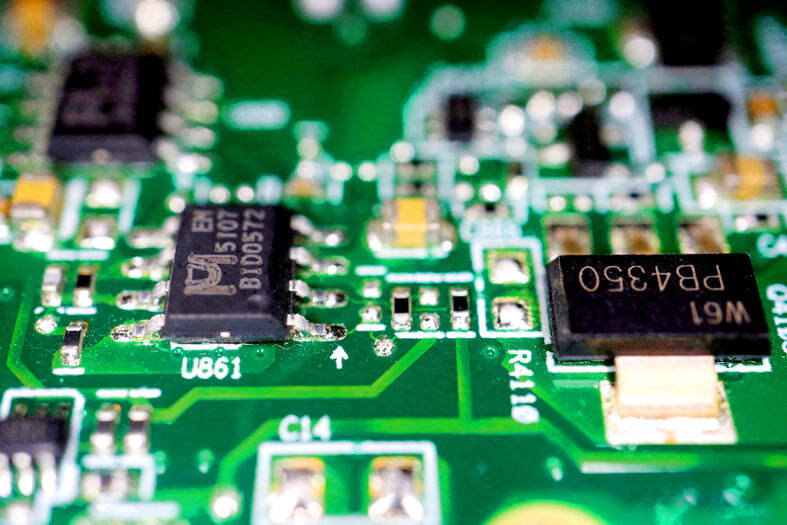Japan has decided to apply foreign trade regulations to chipmaking equipment as part of its efforts to secure stable supply chains, the Japanese Ministry of Finance said yesterday.
Foreign investors are now required to give prior notice when conducting direct investment in equipment tied to chipmaking, including when acquiring a 1 percent or bigger stake in a listed company or buying shares in an unlisted company, the ministry said in a statement.
The move also aims to address the risk of technology leakage and keep commercial technologies from being used for military purposes, it said.

Photo:Florence Lo, Reuters
Other products added to the list of so-called “core business sectors” include advanced electronic components, machine tool components, marine engines, fiber optic cables and multifunctional machines, the ministry said.
With the additions, core business sectors now cover all specified critical products under the nation’s economic security promotion act, the ministry added.
The targeted move would help the government enhance national security while its impact on companies is expected to be limited, a ministry official said.
The move comes as Japan tries to revive its own capacity to produce semiconductors as a pillar of its economic security strategy.
Japan has already earmarked some ¥4 trillion (US$26.9 billion) over the past three years to recharge its semiconductor sectors and promote digitalization. The government is also drafting legislation to further boost investment in chipmaking capacity at home.
With a new semiconductor strategy, Tokyo has aggressively recruited foreign companies such as Taiwan Semiconductor Manufacturing Co (台積電) with hefty subsidies to boost chipmaking at home.
Critics say past efforts failed to revive the sector, because they did not incorporate collaboration with foreign companies.

When an apartment comes up for rent in Germany’s big cities, hundreds of prospective tenants often queue down the street to view it, but the acute shortage of affordable housing is getting scant attention ahead of today’s snap general election. “Housing is one of the main problems for people, but nobody talks about it, nobody takes it seriously,” said Andreas Ibel, president of Build Europe, an association representing housing developers. Migration and the sluggish economy top the list of voters’ concerns, but analysts say housing policy fails to break through as returns on investment take time to register, making the

EARLY TALKS: Measures under consideration include convincing allies to match US curbs, further restricting exports of AI chips or GPUs, and blocking Chinese investments US President Donald Trump’s administration is sketching out tougher versions of US semiconductor curbs and pressuring key allies to escalate their restrictions on China’s chip industry, an early indication the new US president plans to expand efforts that began under former US president Joe Biden to limit Beijing’s technological prowess. Trump officials recently met with their Japanese and Dutch counterparts about restricting Tokyo Electron Ltd and ASML Holding NV engineers from maintaining semiconductor gear in China, people familiar with the matter said. The aim, which was also a priority for Biden, is to see key allies match China curbs the US

NOT TO WORRY: Some people are concerned funds might continue moving out of the country, but the central bank said financial account outflows are not unusual in Taiwan Taiwan’s outbound investments hit a new high last year due to investments made by contract chipmaker Taiwan Semiconductor Manufacturing Co (TSMC, 台積電) and other major manufacturers to boost global expansion, the central bank said on Thursday. The net increase in outbound investments last year reached a record US$21.05 billion, while the net increase in outbound investments by Taiwanese residents reached a record US$31.98 billion, central bank data showed. Chen Fei-wen (陳斐紋), deputy director of the central bank’s Department of Economic Research, said the increase was largely due to TSMC’s efforts to expand production in the US and Japan. Investments by Vanguard International

STRUGGLING TO SURVIVE: The group is proposing a consortium of investors, with Tesla as the largest backer, and possibly a minority investment by Hon Hai Precision Nissan Motor Co shares jumped after the Financial Times reported that a high-level Japanese group has drawn up plans to seek investment from Elon Musk’s Tesla Inc to aid the struggling automaker. The group believes the electric vehicle (EV) maker is interested in acquiring Nissan’s plants in the US, the newspaper reported, citing people it did not identify. The proposal envisions a consortium of investors, with Tesla as the largest backer, but also includes the possibility of a minority investment by Hon Hai Precision Industry Co (鴻海精密) to prevent a full takeover by the Apple supplier, the report said. The group is